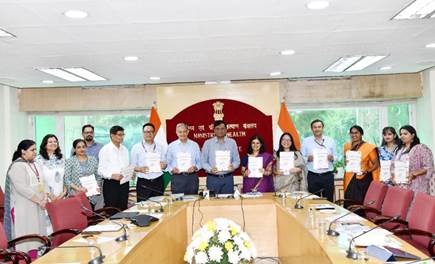New Delhi: To address the growing public health concern of Non-Alcoholic Fatty Liver Disease (NAFLD), the Union Health Ministry today released revised Operational Guidelines and a Training Module aimed at improving patient care and outcomes through evidence-based practices. The launch took place in New Delhi, with key figures from the health sector emphasizing the urgency of addressing NAFLD as a major non-communicable disease (NCD).
Union Health Secretary Shri Apurva Chandra, in his address, underscored the importance of recognizing NAFLD as a pressing health issue linked to metabolic disorders such as obesity, diabetes, and cardiovascular diseases. “India has taken the lead in recognizing NAFLD as a major NCD. Out of every 10 people, one to three can have NAFLD, highlighting the widespread impact of the disease,” he said. Shri Chandra also stressed that the revised guidelines would provide a structured approach for health workers across all levels, from community health workers to medical officers, and promote the need for lifestyle modifications to reduce NAFLD prevalence.
Smt. Punya Salila Srivastava, Officer on Special Duty, Union Health Ministry, emphasized the importance of making these guidelines accessible at the grassroots level. She said, “The early detection of NAFLD is crucial, and these new training modules will significantly enhance the capacity of healthcare professionals to combat the growing burden of NCDs in India.”
Dr. S.K. Sarin, Director of the Institute of Liver and Biliary Sciences (ILBS), noted that the release of these documents marks a momentous step in India’s fight against liver-related NCDs. He pointed out the close link between liver health and major diseases such as diabetes, heart disease, and cancer, adding that the impact of these measures would become evident in the coming years.
NAFLD has emerged as a silent epidemic in India, with community prevalence ranging from 9% to 32% depending on age, gender, area of residence, and socioeconomic status. The disease is closely tied to lifestyle risk factors like poor diet, physical inactivity, tobacco and alcohol use, and air pollution. India is the first country to integrate NAFLD into its National Programme for Prevention and Control of NCDs, which was initiated in 2021.
The revised guidelines focus on early detection and health promotion to ensure timely and appropriate care for NAFLD patients. A multidisciplinary approach is advocated, encouraging collaboration among healthcare providers from various fields to offer holistic care to individuals affected by the disease. The Training Module is designed to build the capacity of healthcare professionals at the primary level, covering topics such as risk factors, screening, diagnostic protocols, and treatment guidelines. It also emphasizes lifestyle modification, patient education, and the importance of early intervention.
Prominent attendees at the event included Shri Jaideep Kumar Mishra, Additional Secretary and Financial Adviser, Health Ministry; Smt. L S Changsan, Additional Secretary, Health Ministry; and Smt. Latha Ganpathy, Joint Secretary, Health Ministry. Representatives from 36 States and Union Territories, along with experts from WHO, AIIMS, ILBS, and other premier medical institutions, participated in the meeting virtually.





